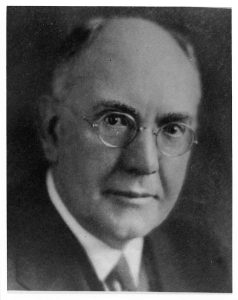By Paul A. Tenkotte
Special to NKyTribune
I have to admit it. I feel sorry for Brent Spence. This dedicated public servant, a U.S. Congressman for 32 years (1931–63), did more for the good of Northern Kentucky than any other politician on record. And the poor soul has a “functionally obsolete” bridge named for him, prompting who-knows-how-many people to inadvertently curse, using his name each and every day of the year. It’s time to set the record straight.

U.S. Congressman Brent Spence, circa 1940. (Courtesy of the Kenton County
Public Library, Covington)
Born in December 1874, Brent Spence was the great-grandson of Washington Berry and Alice Thornton Taylor, sister of the founder of Newport, Kentucky, James Taylor Jr. Further, Spence was the grandson of James Berry, founder of Dayton, Kentucky, and the nephew of Albert Berry, founder of Bellevue, Kentucky, mayor of Newport, and a U.S. Representative (1893–1901).
Brent Spence graduated from the Law School of the University of Cincinnati in 1895 and joined the law firm of his uncle Albert. In 1930, during the Great Depression, he was elected to the first of 16 consecutive terms to the U.S. House of Representatives.
A stanch Democrat, he was a New Dealer, that is, a supporter of Franklin D. Roosevelt (president, 1933–45).
Brent Spence played a major role in the post-World War II era as Chairman of the U.S. House’s Committee on Banking and Currency. He was a delegate at the Bretton Woods Conference, which set the course for the economic rebuilding of the war-torn world.
The Bretton Woods Agreement established the IMF (International Monetary Fund) and the IBRD (International Bank for Reconstruction and Development, now part of the World Bank). It also based the stability of world currency on the US dollar, which was then tied to gold.
Regionally, Brent Spence used his influence to gain important projects for Northern Kentucky, including the Great Cincinnati Airport (now, the Cincinnati/Northern Kentucky International Airport), the Internal Revenue Service Center in Covington, public housing projects, and floodwalls for Covington, Maysville, and Newport.
Spence died in September 1967, aged 92. He is buried in Evergreen Cemetery in Southgate.
We want to learn more about the history of your business, church, school, or organization in our Ohio River Valley Region. If you would like to share your rich history with others, please contact the editor of “Our Rich History,” Paul A. Tenkotte, at tenkottep@nku.edu. Paul A. Tenkotte, PhD is Professor of History and Gender Studies at Northern Kentucky University (NKU) and the author of many books and articles.
The front page of the Kentucky Post of November 8, 1934 announced the reelection of Congressman Brent Spence, part of a landslide Northern Kentucky victory for FDR’s New Deal during the height of the Great Depression.

























